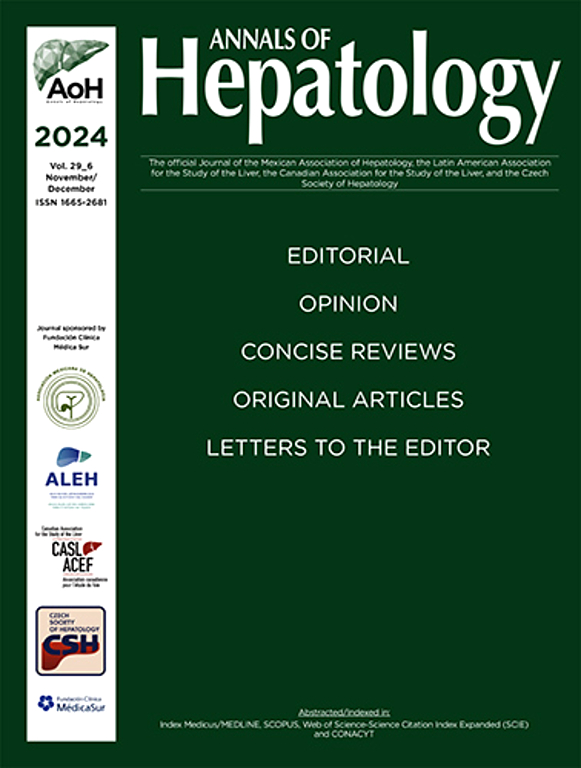REVIRAL: ROADMAP FOR THE ELIMINATION OF VIRAL HEPATITIS IN LATIN AMERICA
IF 4.4
3区 医学
Q2 GASTROENTEROLOGY & HEPATOLOGY
引用次数: 0
Abstract
Introduction and Objectives
Viral hepatitis elimination remains a major challenge in Latin America due to disparities in access to diagnosis, treatment, and follow-up. The REVIRAL study aims to assess disease burden, evaluate healthcare delivery models, and propose strategies to achieve elimination targets.
Materials and Methods
REVIRAL is a multicenter, retrospective study combining database review and prospective surveys targeting healthcare professionals and patient organizations across 22 countries. Key focus areas include: hepatitis B, C, and D epidemiology in high-risk groups; identification of diagnosed but untreated individuals; evaluation of screening methods for the general population; analysis of national plan coverage; availability of diagnostic tools and treatment access; and implementation of microelimination strategies in priority settings.
Results
Findings reveal major disparities in regional responses. Thirteen countries report a national plan, but implementation varies. Health systems range from full public coverage to patient-funded models. Serology for hepatitis B and C is widely available, but molecular testing is fully accessible in only 10 countries. Universal high-risk screening exists in five nations but lacks territorial consistency. Six countries have microelimination strategies in prisons or dialysis centers, though not widespread. Treatment is free in nine countries; elsewhere, patients bear significant costs, with uneven coverage. Hepatitis B vaccination rates are optimal (≥75%) in only 10 countries. Treatment registries are scarce, limiting impact evaluation. Access delays range from 2–6 months. Despite effective therapies, only 10–20% of diagnosed patients receive treatment, indicating persistent economic, administrative, and equity barriers.
Conclusions
REVIRAL highlights the urgent need to strengthen surveillance systems, enhance inter-agency coordination, and promote equitable access to care. Key recommendations include establishing real-time monitoring, optimizing patient identification, and tailoring strategies to each country's context.
Reviral:拉丁美洲消除病毒性肝炎路线图
前言和目的由于在诊断、治疗和随访方面存在差异,消除病毒性肝炎在拉丁美洲仍然是一项重大挑战。REVIRAL研究旨在评估疾病负担,评估医疗服务模式,并提出实现消除目标的策略。reviral是一项多中心、回顾性研究,结合数据库审查和前瞻性调查,针对22个国家的医疗保健专业人员和患者组织。重点领域包括:高危人群的乙型、丙型和丁型肝炎流行病学;识别确诊但未经治疗的个体;对普通人群筛查方法的评价;国家计划覆盖面分析;诊断工具的可得性和治疗的可及性;在重点设置中实施微消除战略。结果调查结果揭示了地区反应的主要差异。有13个国家报告了国家计划,但实施情况各不相同。卫生系统包括从完全公共覆盖到病人资助的模式。乙型和丙型肝炎的血清学可广泛获得,但分子检测仅在10个国家完全可获得。5个国家存在普遍的高危筛查,但缺乏地域一致性。有6个国家在监狱或透析中心实施了微消除策略,但并不普遍。9个国家提供免费治疗;在其他地方,患者承担着巨大的费用,而且覆盖范围参差不齐。只有10个国家的乙肝疫苗接种率达到最佳(≥75%)。治疗登记很少,限制了影响评估。访问延迟从2-6个月不等。尽管有有效的治疗方法,但只有10-20%的确诊患者接受治疗,这表明持续存在经济、行政和公平障碍。reviral报告强调了加强监测系统、加强机构间协调和促进公平获得医疗服务的迫切需要。主要建议包括建立实时监测、优化患者识别以及根据各国情况制定相应战略。
本文章由计算机程序翻译,如有差异,请以英文原文为准。
求助全文
约1分钟内获得全文
求助全文
来源期刊

Annals of hepatology
医学-胃肠肝病学
CiteScore
7.90
自引率
2.60%
发文量
183
审稿时长
4-8 weeks
期刊介绍:
Annals of Hepatology publishes original research on the biology and diseases of the liver in both humans and experimental models. Contributions may be submitted as regular articles. The journal also publishes concise reviews of both basic and clinical topics.
 求助内容:
求助内容: 应助结果提醒方式:
应助结果提醒方式:


